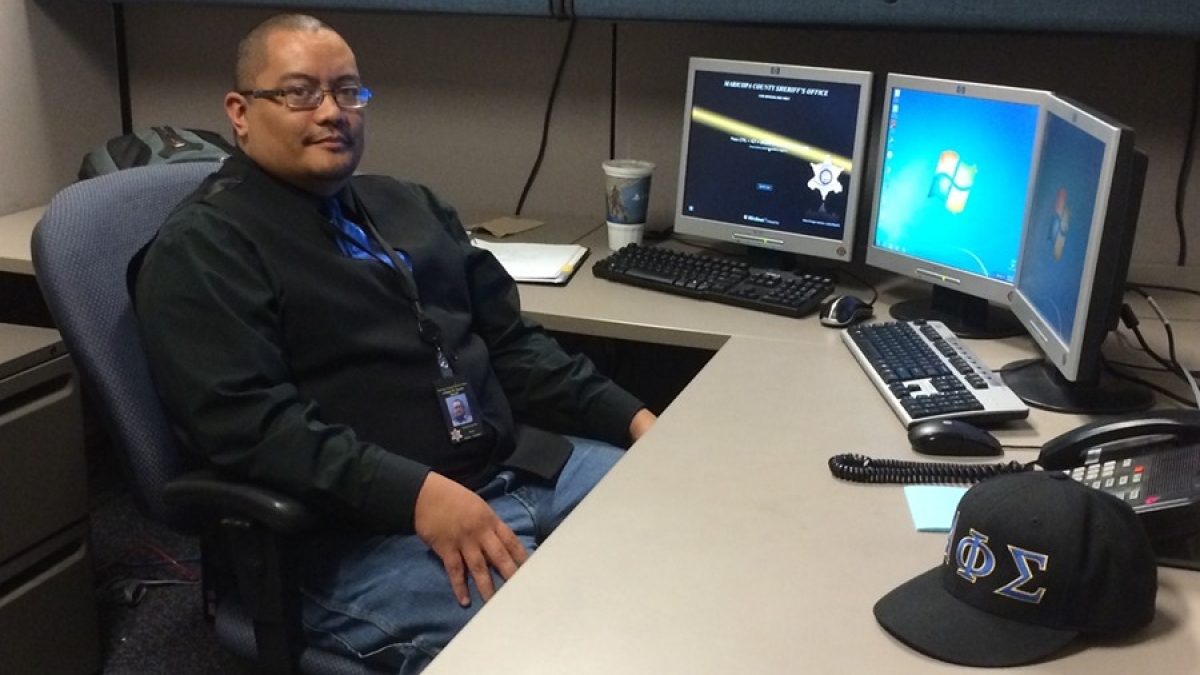Criminology intern helps nab suspect on first day

Eye-opening. That’s what you could call Richie Del Rio’s first day on the job at an internship in the Criminal Intelligence Division of the Maricopa County Sheriff’s Office.
It was eye-opening, not for Del Rio, but for his supervisors. They were amazed at how fast the ASU School of Criminology and Criminal Justice student helped nab a suspect. It all started with a call from a patrol officer who was out of leads on a burglary investigation.
“This officer had already tried what he could to find the suspect,” says Sgt. Jon Halverson of the Criminal Intelligence Division’s Counter-Terrorism Unit. “And I believe he had a name and date of birth. He reached out to us. I went and gave it to Richie to see what he could do.”
Del Rio was already busy trying to track down a suspect in a several-years-old sex crime case. The suspect had recently re-entered the country. He put that case aside and began working on the burglary case. He took what information he found and created what’s called a “workup” that made its way to the officer in the field. Del Rio went back to work on the sex crime case.
“I had a bunch of things going through my head,” says Del Rio. “And then my supervisor comes up and says, 'Congratulations! They caught the guy.'"
Del Rio was confused until his supervisor explained that they had caught the suspect he had created the workup for earlier that morning. "I was speechless, I was shocked,” he said.
Del Rio is not your typical intern. Or college student. The 39-year-old was a field service engineer and technician repairing semiconductor manufacturing equipment. In the aftermath of the Great Recession, he was laid off. He saw it as an opportunity to go back to school and combine his problem-solving skills with police work. His dad was a cop in the Philippines and his uncle was a member of the country’s Secret Service. But Del Rio didn’t want to be a police officer; he wanted to be an intelligence analyst. His first day as an intern confirmed he made the right decision.
“At the time I was excited, it was the kind of feeling I knew I would eventually feel doing this job because, for me, being an officer on the street wasn't really my thing,” Del Rio says. “But I knew that as soon as I learned about intelligence analysis, this was going to be my niche.”
It’s a growing and important niche in law enforcement. Once the domain of agencies involved in national security, intelligence analysis is now a part of federal, state and local and law enforcement agencies. Since 9/11, those agencies are sharing information at unprecedented levels.
Del Rio works in a cubicle in the Arizona Counter Terrorism Information Center (ACTIC) located in a nondescript office building off I-17 in North Phoenix. Local, state and federal law enforcement agencies work with counterparts in fire, emergency management, public health and other government agencies. More than 140 agencies are represented at the ACTIC. And ASU criminology students have a chance to be a part of it.
“I want to emphasize that this program is unlike any program that I know of, especially it’s unlike any program in this state,” Halverson says. “We're teaching these ASU interns how to actually do the job. We're giving them a skill set that is second-to-none. And a skill set that was previously unobtainable unless you were a sworn law enforcement officer or a criminal researcher or analyst.”
The Sheriff’s Office is looking for three or four interns for the spring 2015 semester. Del Rio graduates in December and hopes to land a position as an intelligence analyst. Halverson believes the internship experience will help.
“We want to make him marketable and we want to make him a true asset to the law enforcement community,” he said. “If he chooses to be an analyst, if he chooses to be a street officer, if he chooses to be detective or if he chooses to be a SWAT officer – any of those roles will be greatly enhanced by his ability to seek information, vet the information into actionable intelligence and then analytically use the intelligence to do the job. He’ll have experience that no one else will.”